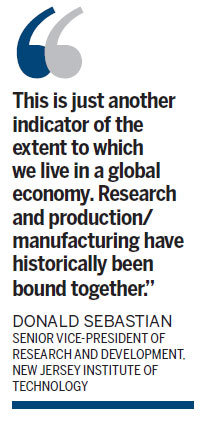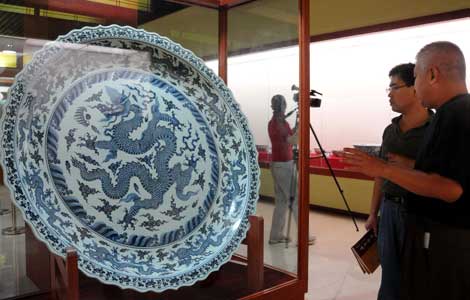Lab to explore wireless tech for trains
Updated: 2013-08-02 11:05
By Chen Jia in San Francisco (China Daily)
|
||||||||

New Jersey Institute of Technology (NJIT) and China South Rail (CSR) have just established a US-based lab to look for breakthroughs in wireless technology on high-speed trains.
"The proposed research is to focus on applications for the high-speed rail system in China," said Donald Sebastian, NJIT senior vice-president of research and development.
Researchers will look for ways to improve the use of wireless technology in three modes: control applications within the moving train, control applications between the train and its surroundings, and wireless services for passengers.
Their investigations will also cover the design of onboard wireless "backbone" networks, and how they are configured and evaluated.
Sebastian said that if their findings spin-off into other uses in China South Rail's lines, it would be an added benefit, but for now the high-speed environment was the objective of their research.
The partnership was sparked in the summer of 2010 while Sebastian was traveling to a number of cities in China that were potential partners.
One of those stops was Zhuzhou, Hunan province, where his team met an NJIT alumna, Jackie Zhou, who headed the city's technology district development office.
"One of her principal companies was CSR," Sebastian recalled. "As they learned more about NJIT - and the broad set of programs and research activities here - they became interested in developing some form of formal partnership."
Both parties discussed several different options open to them, and the university delegation visited CSR again last fall, this time with NJIT President Joel S. Bloom along. They agreed that the integration of modern, high-speed digital wireless technology was an important innovation for rail systems, and it was an area that neither side had deep expertise in.
"This is just another indicator of the extent to which we live in a global economy," Sebastian said. "Research and production-manufacturing have historically been bound together."
As China has grown its manufacturing capacity from commodity goods to high tech product lines, it serves as an important partner in bringing resources and practical problems into the research environment, he said.
"We hope that over time these relationships also result in Chinese companies setting up US-based production arms, much like Japanese and European auto manufacturers who have found it more cost effective to manufacture in the US for North American markets than to ship goods across oceans," he said.
"That creates direct and indirect employment in the US, which benefits us all," he said.
chenjia@chinadailyusa.com
(China Daily USA 08/02/2013 page10)
Most Viewed
Editor's Picks

|

|

|

|

|

|
Today's Top News
China faces world's worst managerial shortage
Soybean is king in American exports to China
China sails through 'first island chain'
US should reclaim 10% share
Chinese worry about image abroad
China blasts US Senate resolution
NSA chief details program at hackers' conference
US, Pakistan to start new chapter in relations
US Weekly

|

|















